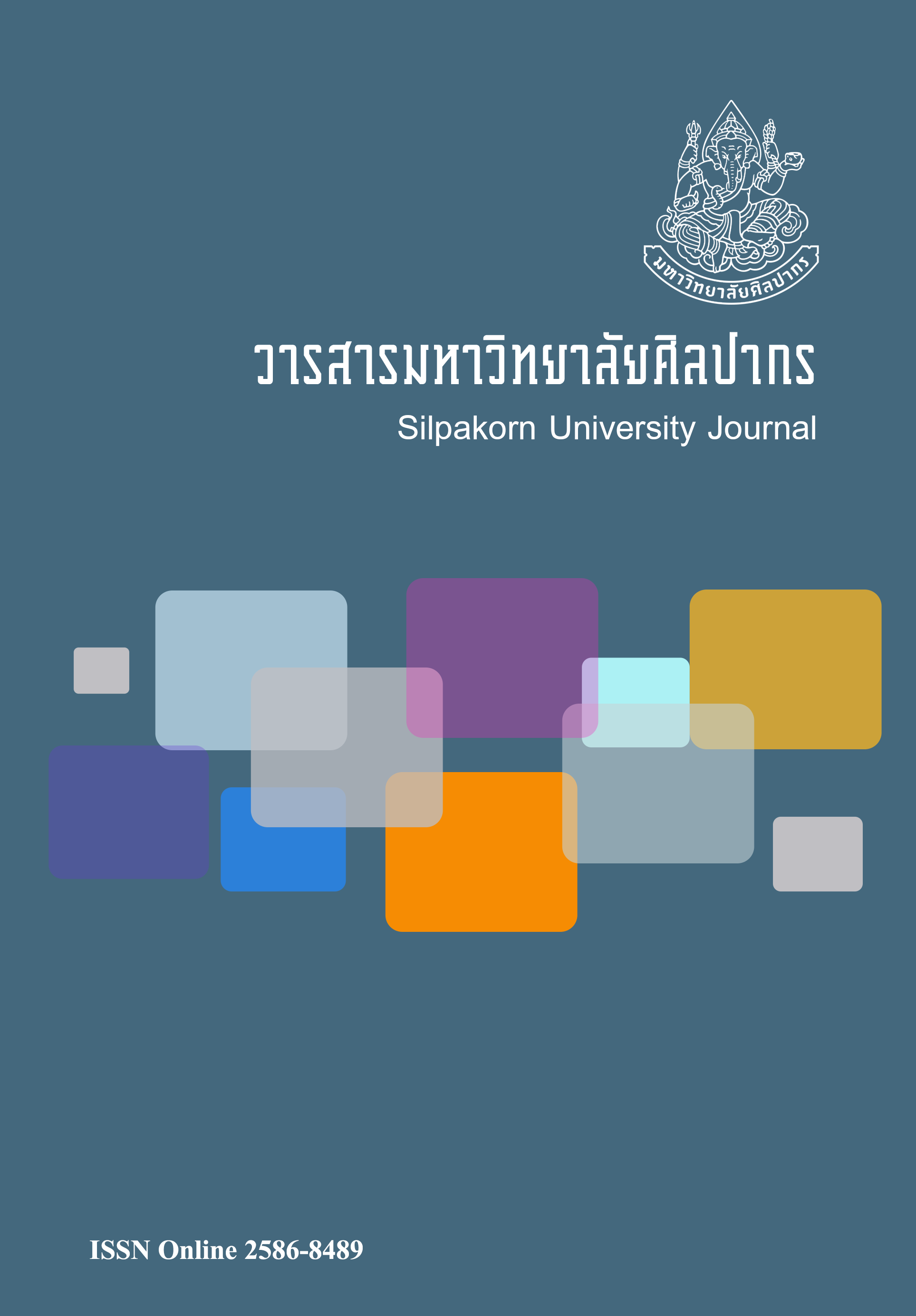การจัดการความรู้ในพิธีเสนเรือนของไทยทรงดำ (Knowledge management of Thai Song Dam’s Senrean)
Main Article Content
Abstract
เสนเรือน เป็นพิธีเซ่นไหว้ผีบรรพบุรุษของไทยทรงดำ ที่แสดงให้เห็นถึงการจัดการความรู้ทางวัฒนธรรม ทั้งความรู้ที่ฝังอยู่ในคนและความรู้ที่ชัดแจ้งของกลุ่มชาติพันธุ์ ผ่านวัตถุประสงค์และกระบวนการประกอบพิธีกรรม ที่สื่อสารให้กลุ่มผู้ร่วมพิธีกรรมได้เรียนรู้ เข้าใจ และเข้าถึงโครงสร้าง ระบบ และกลไกของชีวิตที่มีผีเรือนเป็นศูนย์กลาง ทั้งในโลกนี้และโลกหน้า พิธีเสนเรือนจึงเป็นการจัดการความรู้ที่เสริมพลังคุณค่า ความสำคัญให้อัตลักษณ์กลุ่มชาติพันธุ์สามารถสนองตอบความต้องการของกลุ่มได้อย่างมีนัยยะ จึงสามารถดำรงอยู่และสืบสานสู่อนาคตอย่างเข้มแข็งท่ามกลางกระแสโลกาภิวัตน์ ทั้งยังเป็นปัจจัยกระตุ้นคนปัจจุบันได้เกิดสำนึกรักและภูมิใจในวัฒนธรรมมิติอื่นๆ ของกลุ่มมากขึ้นจนนำไปสู่การศึกษา การอนุรักษ์ และการพัฒนาสืบต่อไป
Senrean is a ceremonial offering to the ancestor spirits (sen wai) of the Thai Song Dam, which reflects the knowledge and wisdom of ethnic group, both tacit and explicit knowledge. Through a system of rituals, the offering is passed to Pheerean (Ancestor spirits), who represent the center of Life, including present life, life after death, and the next life. The ritual conveys an expression o respect and gratitude to ancestors and the family. Furthermore, this ritual is very important among diverse ethnic group around the world.It is also significant for the preservation o traditions so that younger generation of Thai Song Dam learn and understand the value of ethnic unity (coexistence). This represents the Thai song dam’s identity they can be pround of, which will encourage them to study, preserve and pass on their culture to future generations of Thai Song Dam.
Downloads
Article Details
References
Burusphat, S. (1997). Encyclopedia of Thai song ethnic group (สาราน ุกรมกลุ่มชาติพันธุ์ไทยโซ่ง). Bangkok: Shtrrm Mick Ltd.
Jakpitak, N. (2561). Knowledge management process. [Online]. Retrived December 5, 2015 from http://www.thaiall.com/km/indexo.html
Janthasoon, K. (1995). Wisdom and transfer process: a study of “Senrean Ritual” of Lao Song, Phitsanuloke Province (ภูมิปัญญาชาวบ้านและกระบวนการ ถ่ายทอด : การศึกษา “พิธีเสนเรือน” ของชาวลาวโซ่ง จังหวัดพิษณุโลก). Master of Arts Program in Department of Adult and Continuing Education,Department of Education,Silpakorn University, Nakhon Pathom, Thailand.
Khaysuban, A.(2007). Knowledge management, the genesis (การจัดการความรู้ฉบับปฐมบท). Bangkok: Phetkasem Printing Groups.
Kidjarukkul, N. (1989). The study of settlement patterns: population, economy, and culture of Laos, Thai ethnic minority in Nakhon Pathom province (การศึกษารูปแบบการตั้งถิ่นฐานประชากร เศรษฐกิจ และวัฒนธรรมของลาวโซ่งในจังหวัดนครปฐม). Nakhon Pathom: Silapakorn University.
Muenjanchoey, R. (1999). Worldview of ethnic group in Thailand: The belief in ghost of Thai Song (โลกทัศน์ของกลุ่มชาติพันธุ์ในประเทศไทย: ความเชื่อเรื่องผีของไทยโซ่ง). Bangkok: Shtrrm Mick Ltd.
Noknoi, J. et al. (2010). Various perspectives of knowledge management and the creation of a learning organization (นานาทรรศนะการจัดการความรู้ และการสร้างองค์การแห่งการเรียนรู้). Bangkok: Chulalongkorn University.
OPDC. Knowledge management process. [Online]. Retrived December 5, 2015 from http://www.thaiall.com/km/indexo.
Phanith, A. (1994). Ending words in Lao Song language (คำลงท้ายในภาษาลาวโซ่ง). Master’s dissertation, Mahidol University, Nakhon Pathom, Thailand.
Panich, V. (2004). What isknowledge management? – Don’t execute, don’t know.[Online]. Retrived August 8, 2015 from http://www.kmitl.ac.th/science/km/kmdoc_1.htm
Panich, V. (2008). KM (Guidelines) a word a day: 615. KM book introduction in education section (5.1). [Online]. Retrived March 1, 2015 from http://www.gotoknow.org/blogs/posts/224025
Panich, V. .Knowledge management process. [Online]. Retrived December 5, 2015 from http://www.thaiall.com/km/indexo.ht
Parichartthanakul,B. (2003).The ritualistic belief in ghost of Thai Song Ban Phai Hu Chang, Amphoe Banglen Nakhonpathom Province (ความเชื่อเรื่องผีในพิธีกรรมของชาวไทยโซ่ง บ้านไผ่หูช้าง อำเภอบางเลน จังหวัดนครปฐม). Master’s dissertation, Ramkamhaeng University, Bangkok, Thailand.
Phosan, A. (2009). Essence, beliefs and Lao Song ritual (สารัตถะ คติความเชื่อ และพิธีกรรมลาวโซ่ง). Mahasarakham: Aphichart Printing
Tintasuwan,B.(2002).A study of clothes and apparel of Thai Song Dam, Hnong Prong Subdistrict, Khoayoi District, Phetburi Province (ศึกษาผ้า และเครื่องนุ่งห่มของชาวไทยทรงดำ ตำบลหนองปรง อำเภอเขาย้อย จังหวัดเพชรบุรี). Master’s dissertation, Ramkamhaeng University,Bangkok, Thailand.
Thoraphap, Chop. [Interview]. (2015, July 25). address: 10/2 Moo 5 DonkhaminSubdistrict, Banglen District, Nakhon Pathom, Thailand.
Wasee, P. (2002). Knowledge management: human liberation process to potential, freedom and happiness (การจัดการความรู้ กระบวนการปลดปล่อยมนุษย์สู่ศักยภาพ เสรีภาพ และความสุข). Bangkok: The Knowledge ManagementInstitute (KMI).
Wasee, P. (2005). “Knowledge Management”: The liberation process of human being. [Online]. Retrived March 1, 2015 from http://prachatai.com/journal/2005/12/6571
Yensamuth, P. (1981). Word and meaning in Lao Song languages (คำและความหมายในภาษาลาวโซ่ง). Master’s dissertation, Silapakorn University,Nakhon Pathom, Thailand.


